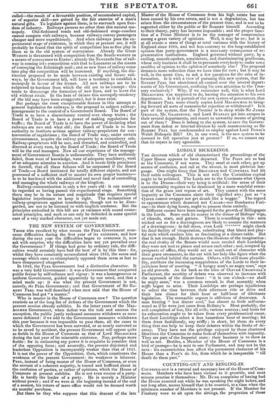THE NEW SYSTEM OF GOVERNMENT.
THOSE who recollect by what means the PEEL Government over- came difficulties during the first year of its existence, and how during the next year the difficulties began to overcome it, now ask with surprise, why the difficulties have not yet prevailed over the Government ? If things had gone by ordinary rule, the diffi- culties would certainly have had the best of it by this time : for, whilst they have constantly accumulated since 1842, the sense and courage which once so triumphantly opposed them seem at last to have disappeared altogether.
In 1842, the PEEL Government had a distinctive character. It was a very bold Government : it was a Government that conquered public favour by self-reliance and vigour : it was a homogeneous or uniform Government, guided apparently by one mind, and that a mind made up: it was what the present Government is not, namely, the PEEL Government ; and that Government of Sir Ro- BERT PEEL was well described when men said that the House of Commons had got "a master." Who is master in the House of Commons now ? The question reminds us of the long list of defeats of the Government which the present session already exhibits. In the latter years of the MEL- BOURNE Government, when defeat was the rule and success the exception, the public justly reckoned measures withdrawn as mea- sures defeated: if we add to the Government measures withdrawn this year because it was impossible to pass them, all the cases in which the Government has been outvoted, or so nearly outvoted as to be saved by accident, the present Government will appear quite as feeble in the House of Commons as that of Lord MELBOURNE during the last year of its miserable existence. Nay, perhaps more feeble: for in estimating any power it is requisite to consider that of the opposing force; and assuredly, the present disjointed and leaderless Opposition is incomparably weaker than that of 1841. It is not the power of the Opposition, then, which constitutes the weakness of the present Government : its weakness is inherent. PEEL, instead of being master of the House of Commons, or even the servant of a coherent majority, is tossed and buffeted about in the confusion of parties, or rather of opinions, which the House of Commons at present exhibits. He is not even master of a party. He is hardly the leader of a party. He is merely a Minister without power ; and if we were at the beginning instead of the end of a session, his tenure of mere office would not be deemed worth six months' purchase.
But there be they who suppose that this descent of the late
Master of the House of Commons from his high estate has not been caused by his own errors, and is not a degradation, but has arisen from the circumstances of the present time, and is not to be regretted either by the public or Sir ROBERT himself. According to their theory, party has become impossible; and the proper func- tion of a Prime Minister is to be the manager of compromises among a great variety of opinions. Well, it may be so ; but it is at all events a state of things at total variance with the history of England since 1688, and not less contrary to the long-established opinion that party-government is a necessary consequence of re- presentative institutions. England governed without party, by a smiling, smooth-spoken, considerate, and discriminating gentleman, whose only business it shall be to persuade everybodyto make some sacrifice of opinion to the opinion of somebody else ! The proposal demands more reflection than we have time for now ; but it may be well, in the mean time, to ask a few questions for the sake of in- formation. Is it with a view of pursuing this new system, that Sir ROBERT PEEL has abandoned all control over the several depart- ments of his Government, confining his own attention to the Trea- sury exclusively ? Why, if we remember well, this is what Lord MELBOURNE was supposed to do, barring the attention to his own department. Is it in pursuit of the new system of government, that Sir ROBERT PEEL more closely copies Lord MELBOURNE in bring- ing forward all sorts of measures for rejection or withdrawal ? Is it part of the system, that the Premier is to sleep while Sir JAMES Gaamisr, Mr. GLADSTONE, and Lord STANLEY get into scrapes in their several departments, and resort to unworthy means of getting out of them ? Does it belong to the system, to save the Govern- ment from defeat or internal division by such manceuveriug as Sir ROBERT PEEL has condescended to employ against Lord Powni's Welsh Bishopric Bill ? Or, in one word, is the new system to be deemed in full operation just at present ? If so, we cannot say that its aspect is very agreeable.


























 Previous page
Previous page